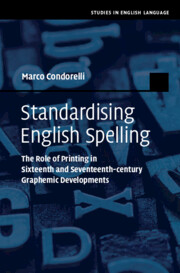 Standardising English Spelling
Standardising English Spelling Book contents
- Standardising English Spelling
- Studies in English Language
- Standardising English Spelling
- Copyright page
- Contents
- Figures
- Tables
- Acknowledgements
- Abbreviations
- Chapter 1 Introduction
- Part I Context
- Chapter 2 Theoretical Framework
- Chapter 3 Pragmatic Framework
- Part II Empirical Method
- Part III Case Studies
- Bibliography
- Index
Chapter 3 - Pragmatic Framework
from Part I - Context
Published online by Cambridge University Press: 31 March 2022
- Standardising English Spelling
- Studies in English Language
- Standardising English Spelling
- Copyright page
- Contents
- Figures
- Tables
- Acknowledgements
- Abbreviations
- Chapter 1 Introduction
- Part I Context
- Chapter 2 Theoretical Framework
- Chapter 3 Pragmatic Framework
- Part II Empirical Method
- Part III Case Studies
- Bibliography
- Index
Summary
Chapter 3 provides an overview of some of the most fundamental developments in the market of early English print, as well as changes in the organisational and political arrangements of the business of printing in Early Modern England. These pieces of information will be pivotal for understanding the dynamics of spelling standardisation uncovered in the case studies to be included in the book. The chapter departs from the idea that the printing press was not, on its own, an agent of change; instead, printing acted as a bridge from handwriting to mass book production, generating, sustaining and organising manuscript features. The chapter also describes the connections between the English printing industry and broader organisational changes, covering milestone events like the establishment of the Stationers’ Company in 1557, the implementation of censorship rules from the English government, the formation of the English Stock and some of the major typographic innovations introduced at the time.
- Type
- Chapter
- Information
- Standardising English SpellingThe Role of Printing in Sixteenth and Seventeenth-century Graphemic Developments, pp. 40 - 58Publisher: Cambridge University PressPrint publication year: 2022


